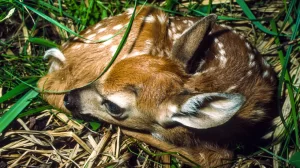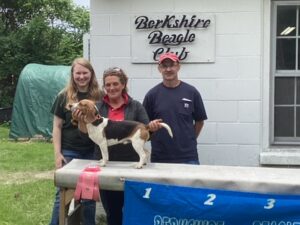MassWildlife says, leave it alone. The animal may be motionless and seem vulnerable, but this is the normal behavior. Even if you see a fawn alone for several days, leave it alone. The mother is probably feeding or bedded nearby. Does visit their fawns to nurse very infrequently, a behavior that helps fawns avoid detection by predators. It is not uncommon for fawns to be left alone for 6-8 hours at a time. Young fawns are usually quite safe when left alone because their color pattern and lack of scent help them to remain undetected.
A couple of years ago, I wrote about a doe that gave birth on an island in Lake Ashmere, probably to get away from people and predators. While fishing one early morning, the doe swam past me and went up on the island. A few minutes later, there they were mother and a tiny happy fawn splashing along its shoreline.
If you have taken a fawn into your care, you should immediately return it to where you found it, or to safer cover nearby (within 200 yards). Then, quickly leave the area to ensure the fawn doesn’t follow you and so the mother feels safe enough to return. The mother will soon return to nurse the fawn, even after it has been handled by humans. Don’t try and feed fawns as they have sensitive stomachs.
If a fawn is visibly injured, call MassWildlife at 508-389-6300. Fawns cannot be cared for by wildlife rehabilitators.
e facts from MassWildlife
- A fawn that is still and unresponsive. Fawns view humans as predators and will drop their head and freeze to avoid detection.
- A fawn that is crying. Fawns can bleat (vocalize) in a way that sounds like crying if they are disturbed or are trying to locate their mother.
- A fawn that is in your yard. Fawns are commonly found bedded in brushy areas with vegetative cover or even in some grassy areas – even in suburban areas close to homes or near roadways. Their mother felt this was a safe place for the fawn. On occasion, a fawn that has been disturbed may wander into a dangerous area or an area where the mother may not feel comfortable going (e.g., onto a road, near people, into a garage, etc.). Only if a fawn is in real danger should you interfere by moving the fawn to nearby forested or shrubby area where there is thick cover. Then leave quickly, so the fawn does not follow, and don’t linger. The mother will not come if you are nearby.
- A fawn alone for long periods of time. Young fawns remain bedded, alone for most of the day and night. The mother will return several times to nurse briefly. She will not approach if people are nearby.
- A fawn that looks skinny and weak. All fawns appear skinny, but it’s not an indication that they are abandoned or starving. If disturbed, they may also look like they are weak or having trouble walking. Never feed a fawn; their stomachs are sensitive and the food or milk you give them can be very harmful.
These are all normal things for fawns, and while they may be alarming, you do more harm than good attempting to care for a fawn.
At the June meeting of the Berkshire County League of Sportsmen, MEP Lt. Tara Carlow commented on this subject. To date, the MEP took only one fawn to a rehabber and that was because the fawn’s mother was dead and the fawn would not leave her. She noted that in the entire state, there is only one fawn rehabber.
Habitat management grant application opens mid-July
Private and municipal landowners of conserved lands can apply for grant funding to support active habitat management projects that benefit wildlife and enhance outdoor recreation opportunities. MassWildlife’s Habitat Management Grant Program (MHMGP) provides financial assistance for projects that:
- improve habitat for game species
- manage for State Wildlife Action Plan species, with an emphasis on State Endangered, Threatened, and Special Concern species, and
- enhance habitat in ecological communities disproportionally susceptible to climate change.
Although MassWildlife and other conservation organizations have made unprecedented investments in land acquisition in Massachusetts, acquisition alone is not enough to guarantee the persistence of biological diversity. Investment in habitat restoration and management is urgently needed on public and private lands across the state. To address this need, MassWildlife and the Executive Office of Energy and Environmental Affairs have substantially increased their investment in habitat management on state wildlife lands and are committed to working with partners to promote these efforts on conserved lands across the state. Over the past 7 years, the MHMGP has awarded over $2.4M in funding to 35 different organizations and individuals for 92 habitat improvement projects.
MassWildlife is offering technical assistance to landowners who want to apply to the MHMGP from now until July 15. If you are interested in speaking to a MassWildlife Habitat Biologist about habitat management on your property or your eligibility for the MHMGP, contact James Burnham, Program Coordinator.
If your project site is within priority habitat, a pre-review of the project is highly encouraged. Email Emily Holt, Senior Endangered Species Review Biologist with a site map and description of the project to begin the pre-review process. Requests for pre-reviews should be made at least 3 weeks before the MHMGP application deadline.
Grant applications will be accepted starting July 15, 2022 and are due by August 31, 2022. Technical assistance on potential grant application projects needs to be completed by the opening of the application period. Visit the MHMGP webpage at any time to learn more about the application process and to see examples of funded projects. For general questions about the grant program, contact James Burnham, Program Coordinator.
Report wild turkey sightings
MassWildlife encourages all wildlife enthusiasts to contribute to our state’s annual Wild Turkey Brood Survey.
Record and report observations of hens (female turkeys), poults (newly-hatched turkeys), jakes (juvenile males) and toms (adult males). Be especially careful when counting broods, because small poults can be tough to see in tall grass or brush.
Every year from June 1 to August 31, your wild turkey reports help state biologists determine productivity, compare long-term reproductive success, and estimate fall harvest potential. Reports come from all regions of the state, from our most rural communities to our most densely-populated areas. Citizen support for the brood survey is a cost-effective way to gather valuable data. It’s also an additional fun way for people to connect with nature. Please note that turkey nesting success can vary annually in response to weather conditions, predation and predator populations, and habitat characteristics.
The easiest method for reporting your wild turkey observations is online. If you prefer to report on paper, you can download and print a Turkey Brood Survey form, complete it over the summer, and mail it to, MassWildlife Field Headquarters, Attn: Brood Survey,1 Rabbit Hill Road, Westborough, MA 01581.
Another nice field trial held at the Berkshire Beagle Club
According to Berkshire Beagle Club (BBC) Board Member, Jeffrey St John and Club Secretary Pat Barry, they had a good turnout at its Derby Trial last Saturday. A Derby Trial is for dogs 6 months old, up to the day they turn 2 years old. The club ran the trial by AKC SPO (Small Pack Option) rules. There were 25 entries which far exceeded their expectations. The beagles were classified as either 13-inch or 15-inch males and females combined.
The winner of the 13-inch class was Butlers Bilbo owned by BBC member Kate Butler of East Chatham, NY. The winner of the 15-inch class was OT’s Finnegan Fluffy Cakes owned by Emmelia Elizabeth May and handled by Scott Harrington, both of Cambridge, NY. BBC President Al Costa’s dog, Timberswamp Miss Lulu, took the Next Best Qualifier (NBQ) honors in the 15-inch class.
According to St John, Club members Sal Dabbraceio, Filipe Ribeiro and John Morris put on a delicious feast, with rabbit, pork and turkey in various entrees along with potato salad and beverage.
Darn! I was unable to attend the trials. I especially wanted to try Filipe’s rabbit meal of which I heard many positive comments.

